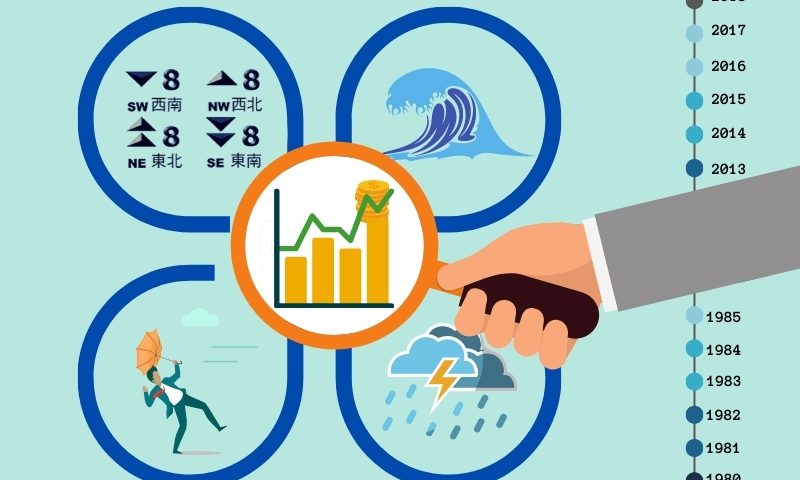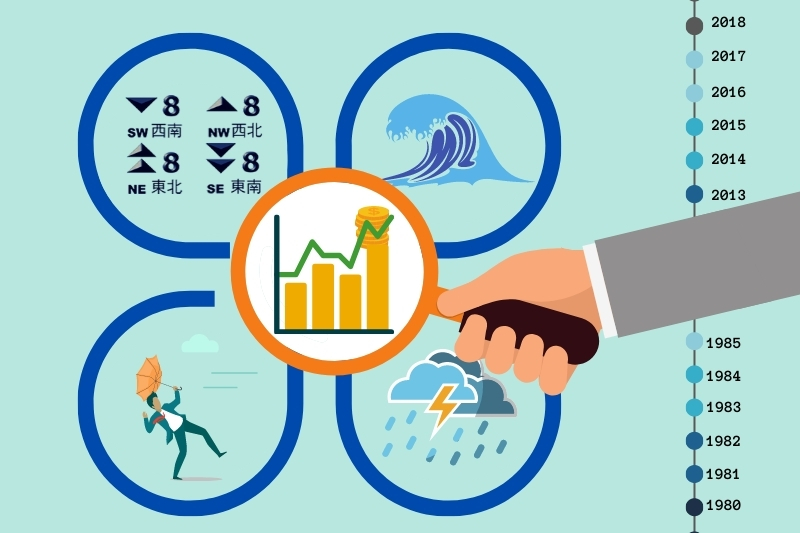
Language and Discourse in COVID-19 Response: The New Zealand Case
7 September 2021
The Social Circles of Chinese Historical Figures 古人朋友圈
29 September 2021Examining the Link between Tropical Cyclones and Local Economy

Principal investigator: Dr ZHANG Lin (Department of Public and International Affairs)

“Typhoon signal number 8 signal is hoisted.” Hong Kong people may be overjoyed to hear this news, as students and those not providing essential and emergency services would have an extra holiday. But we must not overlook the damages brought by the tropical cyclones. Their impact on the economy should be considered. Dr ZHANG Lin, Assistant Professor of CityU’s Department of Public and International Affairs, and his collaborator sought to understand the issue by conducting research using meteorological data from the Hong Kong Observatory (HKO). The findings were presented in the paper Destructive destruction or creative destruction? Unraveling the effects of tropical cyclones on economic growth, published in Economic Analysis and Policy.
Hong Kong is one of the most exposed cities in the world. Reports from HKO show that there were 222 tropical cyclones between 1980 and 2018, and there were on average 1.87 cyclones with sustained wind speeds above 63 km/h per year. According to the tropical cyclone warning signals system used in Hong Kong, a number 8 signal would be issued when there are storms with sustained wind speeds of 63–117 km/h. People are recommended to stay indoors, and economic activities are stopped. Apart from the strong winds, tropical cyclones also trigger heavy downpours and storm surges, and cause physical destruction.
The research looked into the economic impact of tropical cyclone events between 1980 and 2018, focusing on the overall economic growth and sectoral variations. For the latter, seven compositing sectors of Hong Kong economy were taken into account, including 1) agriculture, fishing, mining and quarrying; 2) manufacturing; 3) electricity, gas and water supply, and waste management; 4) construction; 5) wholesale, retail, import and export trades, restaurants and hotels; 6) transportation, storage and communications; and 7) financing, insurance, real estate, and business services.
The baseline analysis was based on the maximum method, which was employed in many tropical cyclone studies and considered the strongest tropical cyclone in a year. The results showed that the highest wind speeds, precipitation and storm surges all had insignificant effects on GDP growth, but the issue of number 8 signals had a noticeable negative impact to economic loss since this climate policy in Hong Kong suspends daily activities in dangerous tropical cyclone weather. The average and weighted methods, which considered all tropical cyclones that triggered a number 8 signal, were also used in the analysis to better capture the overall effects of tropical cyclone events in Hong Kong. It led to a slightly different finding. It was found that wind speed had a significant positive influence on the total GDP in Hong Kong, and the number 8 signals had a significant negative effect.
Based on the results, the researchers concluded that suspension was the main factor that caused a negative influence on overall GDP. Meanwhile, the coefficient of wind speed for the GDP annual growth rate was positive. It showed a sign of “creative destruction”.
The influence of tropical cyclones on sectoral growth was estimated using the average method. The financing, insurance, real estate and business services sector suffered most from the suspension. In general, for every 1.87 suspension days, a decrease of 4.11% in the per capita annual growth rate was recorded. The wholesale, retail, import and export trades, restaurants and hotels sector, and the transportation, storage, and communications sector were also significantly influenced by the number 8 signals. Their annual growth rates decreased by 2.62% and 3.25%, respectively. Construction was the only sector influenced by all three tropical cyclone factors: wind speed, rainfall, and storm surge. A positive relationship was exhibited, indicating that the tropical cyclones had provided the sector with opportunities for rehabilitation and reconstruction. The financing, insurance, real estate and business services sector also exhibited a positive relationship with wind speed. Tropical cyclone insurance could be one explanation for the positive coefficient.
The research also investigated the long-term impact of tropical cyclone events over a five-year timespan. Although the immediate effects of wind speed and precipitation were insignificant, there were delayed negative effects after three and four years. On the contrary, a creative destruction effect caused by storm surges over a more extended period was observed, which suggested an increase in demand for goods and services after the destruction. Meanwhile, although the number 8 signal was found to negatively affect the economy at first, the negative effects were soon mitigated and become positive after the second year. It showed the importance and long-term advantage of the warning system of Hong Kong. Although the temporary suspension may have caused losses initially, the cumulative effects have turned positive later on.
At the sectoral level, only the three sectors that showed significant immediate effects were studied for the long-term influences. The cumulative estimates of the wholesale sector showed positive long-term effects in 5 years, indicating a delayed positive influence of number 8 signals. The transportation sector showed an immediate decrease in the annual growth rate at the year of the cyclone events, but a noticeable increase one year later. The five-year cumulative effect reached 19.4% in total. The finance sector was the only sector that was constantly negatively affected by the suspension, but a recovery trend was still observed in five years.
The research findings have strong policy implications. By learning that the losses due to tropical cyclones depend largely on the issue of the number 8 signals, it could be deduced that the accuracy of warning system predictions is key to avoid unnecessary suspension and mitigate the negative impact of the shutdown on the economy. Despite the fluctuations during the lifetime of tropical cyclones, HKO shall continuously update its climate prediction model and issue number 8 signals more accurately.
Achievements and publication
Zhou, Z., & Zhang, L. (2021). Destructive destruction or creative destruction? Unraveling the effects of tropical cyclones on economic growth. Economic Analysis and Policy, 70, 380-393. https://doi.org/10.1016/j.eap.2021.03.010
